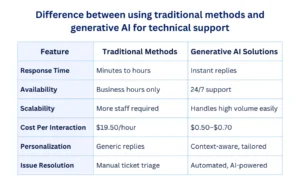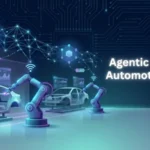The world is undergoing a major technological shift, and no industry remains untouched by its impact. With the rising customer demands and hundreds of competitors, businesses need to incorporate better strategies. Technical support is one such field that requires direct customer interaction, and thus, customer satisfaction is of prime importance. In this blog, we shall discover the landscape of generative AI for technical support and how it facilitates a better customer experience.
Understanding Generative AI in Technical Support
Generative AI is a technology capable of creating new content in different forms. But that is not it; generative AI has analytical, reasoning, and automation features as well, which help any industry increase its efficiency significantly. Differing from traditional rule-based tools, generative AI is much more advanced. It utilizes natural language processing (NLP) to understand human interactions and generate responses in natural language. With generative AI, technical support teams can address regular queries instantly, provide 24/7 support, and offer tailored solutions. Thus, providing an efficient and personalized customer experience. Technical support is a crucial part of customer experience as it involves resolving issues to maximize product value and troubleshoot various challenges. Be it a simple password reset or a complex system diagnosis, generative AI offers unwavering support to technical teams.
Key Benefits of Generative AI in Technical Support
Let’s navigate through the major benefits of using generative AI in technical support. Explore the ways it enhances customer experience.
-
24/7 availability for users
Generative AI has become an essential asset in technical support because it brings automation and intelligence together. Gen-AI-driven virtual assistants offer continuous support to customers, ensuring accessibility at any hour. Regardless of time zones, every customer receives a response to their queries on a priority basis.
-
Instantaneous and accurate responses
Generative AI takes care of recurring, common customer queries instantly. This helps minimize wait times, reducing the time it takes to resolve an issue and enhancing customer satisfaction.
-
Personalization of support for diverse user needs
Differing from the rule-based AI tools, which rely on scripted responses, generative AI for technical support is a tool that understands context. When an AI tool understands the context, it generates more specific and relevant responses to the queries. Generative AI is known for its exceptional personalization features. It provides users with a personalized experience depending on past conversations.
-
Multilingual and global support reach
In organizations that cater to different countries, the language barrier becomes a problem for centralized technical support. Generative AI’s multilingual capabilities allow global support without any language barriers. This allows you to grow your business abroad without any hassle.
-
Scalability during peak periods
There’s a limitation to how many interactions or queries a human technical support expert can handle. On the other hand, even during peak hours, generative AI in technical support can handle a large number of queries together without compromising on quality responses. This allows organizations to scale seamlessly.
-
Data-driven insights for continuous improvement and trend analysis
One of the best benefits of generative AI for technical support is its analytical capabilities. It analyzes market conditions, user queries, and feedback etc, to provide deeper insights that help stakeholders make more informed decisions for business improvements.
Use Cases Across Support Levels
Generative AI for technical support plays different roles at different levels of technical support. Let’s dive into the details of the level-wise role of generative AI in technical support.
Level 1: First-Line Support
At the first point of interaction, generative AI for technical support tools helps automate ticket generation and classification. The first level of generative AI use includes knowledge base search and updates. It classifies the self-help documents to produce in context to the query searches. Chatbots for routine troubleshooting are also level 1 support assistants. Based on its usual queries, it also generates self-service FAQs.
Level 2: Second-Line Support
The second level in generative AI for technical support purposes involves root cause analysis for more complex problems. Generative AI tools help with incident triage and prioritization of issues. It also helps in reporting incidents and automating responses.
Level 3: Advanced Support
The third level of utilizing generative AI for technical support includes deep technical troubleshooting and diagnostics. It facilitates code generation and debugging software. For efficient problem-solving, generative AI helps build knowledge graphs. Among professionals, it facilitates knowledge sharing and collaboration.

Approaches to Implementing Generative AI for Technical Support
After learning the amazing benefits of generative AI in technical support, if you are planning to incorporate AI in your workplace, understand and choose the best-suited AI adoption approach. It includes full-stack AI development, Customizing available AI platforms/modules, or creating a custom in-house AI tool. To create a custom in-house AI, you can connect with some AI development companies. Their AI experts will create an AI tool that meets all your requirements. Such an AI approach is tailor-made and thus suits your requirements and preferences properly. Specifically designed for you, it offers deep integration with your existing systems and internal knowledge bases. A custom AI integration approach is better at regulatory compliance as it is specifically designed for your niche, unlike popular AI products that need heavy customization.
Step-by-Step Implementation Roadmap
To successfully integrate generative AI for technical support or any industry, a clear roadmap is necessary. A strategic roadmap to AI adoption in the workplace prevents any unexpected circumstances or delays. It also ensures a comprehensive approach. Let’s see the most important steps in the strategic adoption of generative AI in technical support.
Technology assessment and readiness
The first step of generative AI integration includes a thorough assessment of your organizational readiness. It means checking whether your existing systems are up-to-date and will or will not support AI integration. In case there are such issues, you might have to invest in resources and infrastructure for AI readiness.
Setting clear business and support goals (KPIs)
The second step after technology assessment in the AI adoption roadmap is to define clear business and support goals. Defining clear goals must consider every team and process in your organization. Right from process goals to organizational and support goals, define what problems AI will solve. This will help you customize your AI tools or create your custom AI tool well.
Data preparation and model training
Artificial intelligence needs training and data for its functioning. Diverse and high-quality data is necessary for training AI models because any discrepancies in data quality can result in biased responses. For training purposes, especially, data preparation is necessary. Also, keep in mind to avoid any data silos in the organization.
Integration with current systems and workflows
This is an important step, as proper integration of AI tools with existing systems and workflows is necessary for desired results. Failure of integration will result in data silos, making all your AI efforts futile. Ensure seamless integration with all the workflows and systems to utilize the full potential of generative AI in technical support.
Functional and ethical testing
Once your tool is ready, it is necessary to pass it through a thorough testing phase. This phase will ensure that the tools are well functioning and maintain ethical considerations. If the testing phase reveals any issues with the tool, they can be addressed immediately before full-fledged AI use in the workplace.
Change management and staff training
Technological upgradation can be a difficult shift for many employees. It demands prior preparation and staff training to handle changes well. For ethical and responsible use of AI tools, a governance team can be created from the staff itself.
Ongoing monitoring and iteration for continuous improvement
Once the tool is ready and in use, it should be monitored frequently to ensure smooth functioning. Apart from monitoring, it can be improved time-to-time for better results.
Challenges and Considerations in Adoption
Artificial intelligence is a technology that can perform tasks that traditionally required human intelligence. This technology is rapidly reshaping our world due to its marvelous benefits. However, before planning to integrate it into your organization, you must consider the obvious challenges associated with it. Such challenges are:
- Data privacy and regulatory compliance
- Ensuring accuracy and relevance of AI responses
- Integration complexities with legacy systems
- Managing and reducing hallucinations or incorrect answers
- Cost and resource allocation for AI projects
- Scalability and adaptability for evolving support needs
- Handling nuanced/complex technical queries
You can expect the best results when Generative AI’s capabilities are paired with human oversight. Humans’ ethical and emotional considerations will guide generative AI to perform its best without any ill consequences. Let us see some of the best practices needed for GenAI implementation.
Best Practices for Successful GenAI Implementation
Here are some key points to consider for a successful generative AI implementation.
- Project planning and clear objectives
- Ensuring data quality and diversity
- Change management and training human agents
- Feedback loops and continuous AI model refinement
- User-centric design for smooth AI-human collaboration
Conclusion
Generative AI is gradually making its place in every industry for its evident benefits. Generative AI for technical support offers automation, speed, efficiency, and better customer satisfaction. The future of any growing business demands quick and accessible technical support, which is facilitated with generative AI. With the highly competitive market conditions, it is important to restructure your business strategy while considering AI implementation. AnavClouds Analytics.ai enables businesses to harness the potential of AI with AI development services. Get in touch with us for exceptional Generative AI services and building custom AI tools. Book your demo session today and understand what AI can do for your business.
FAQs
What is the use of AI in technical support?
AI empowers the technical support teams with automated responses to routine queries, 24/7 accessibility, personalized customer interaction, and impeccable speed.
How does generative AI help in customer support?
Generative AI, unlike other tools, understands the context of the queries. Thus, it generates a relevant and useful response in context to the customer query. Thus, providing a human-like, useful response that enhances customer satisfaction.
How can generative AI help support teams in resolving technical issues?
Generative AI tools help automate routine tasks, allowing teams to focus on high-value tasks. Apart from this, AI tools also help in incident triage and prioritization to get timely attention on necessary issues and resolve them faster.
How can generative AI help in the IT industry?
Generative AI in IT industry helps enhance efficiency in multiple processes like new design prototype creation, code generation, debugging, and report generation for support teams.
Can AI replace customer support?
Although AI-driven chatbots and virtual assistants offer quick responses, context understanding, accessibility, and personalization, they still cannot fully replace customer support professionals.



